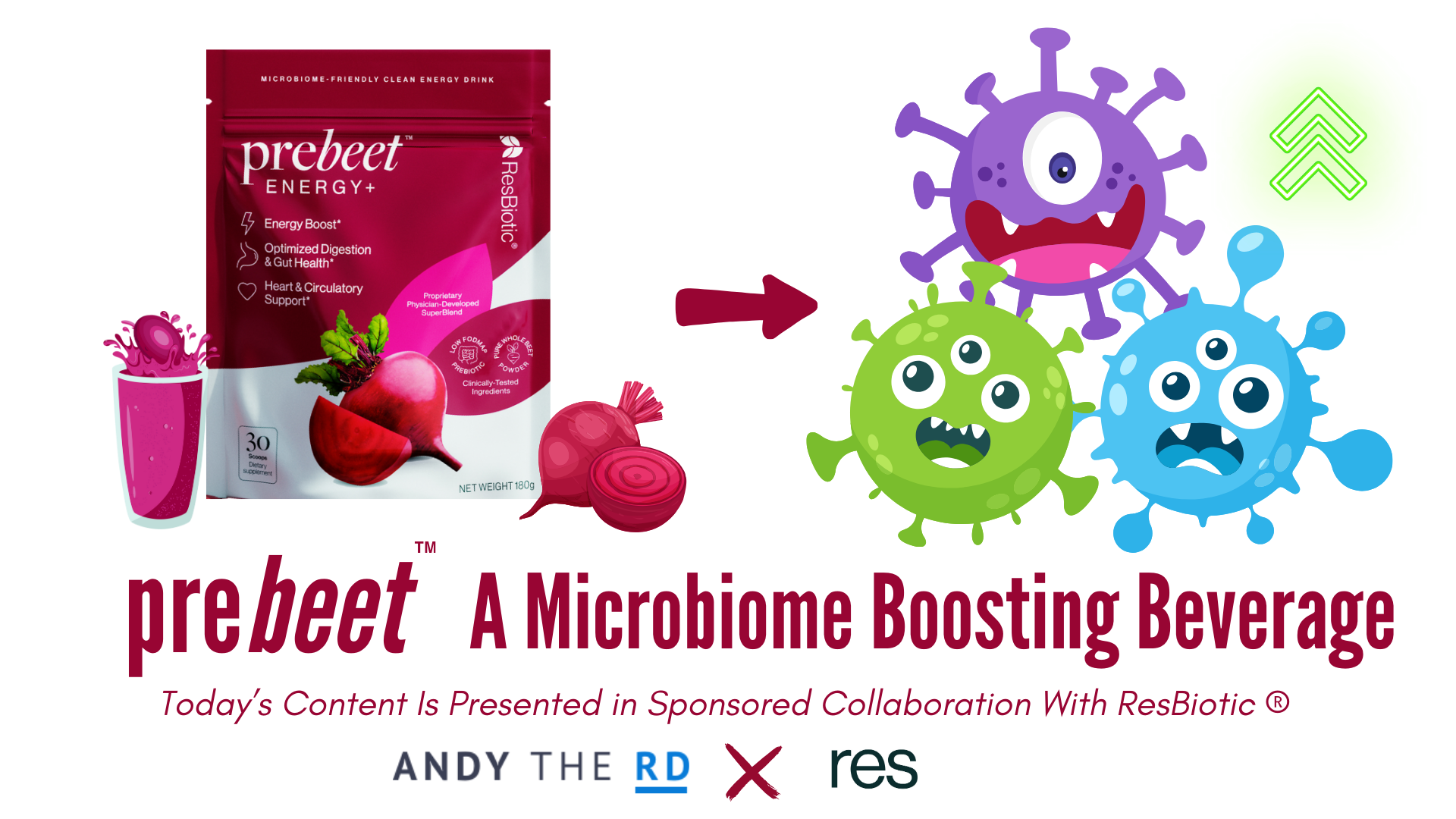My interest in the role that nutrition plays in modifying the human gut microbiome won’t be a surprise to those of you who have taken in my writing or social media content over the last several years.
And for good reason.
The balance of the gut microbiome continues to be associated with better health at every turn for the simple fact that these bacteria influence multiple bodily systems from the brain, to the bowels, to the liver and beyond.
The microbiome influences:
- Focus, Mood & Stress
- Appetite
- Mental Health
- Inflammation
- Blood Sugar Levels
- Immunity
And much, much more.
There are several ways we can improve the levels of healthy bacteria in our digestive tract, one of which is through the consumption of resistant starch.
Resistant starch is a family of unique fibre-like compounds that have prebiotic effects on the human gut microbiome – which is a fancy way to say they stimulate the growth of healthy bacteria.
prebeet, the feature of today’s sponsored content*, is a resistant starch supplement by res that is naturally sweetened (stevia) and available in powdered form and intended for use mixed in water or added to smoothies.
prebeet also contains another unique and highly functional ingredient, beetroot powder, which may confer additional microbiome boosting benefits.
Let’s take a closer look at the science behind this product.
The Microbiome Boosting Benefits Of Resistant Starch
Resistant starch is a fibre-like starchy compound that acts as food (hence prebiotic) for the bacteria in our large intestines.
In turn, these bacteria reward us by growing in number, producing beneficial compounds known as short chain fatty acids, or SCFAs, which play an important role in the benefits associated with the gut microbiome.
There are many different types of resistant starch, but the focus of today’s discussion is Solnul™ which is isolated from potato starch, which I’ll henceforth refer to as RPS (resistant potato starch) in this article.
prebeet contains 3.5 grams of RPS per serving – an amount that has been identified in a recently Nutrients controlled trial to influence our gut bacteria.
The Nutrients Journal Study
If you’d like to examine the full study in question, you can do so here.
Dosage
Control Group ( corn starch), Interventions (3.5 Grams or 7 Grams RPS)
Reminder: prebeet contains 3.5 grams of RS per serving.
Duration
4 weeks
Outcomes:
Both of the intervention groups in this study experienced measurable and statistically significant boosts to healthy bacteria in the Bifidobacterium and Akkermansia genus.
The Benefits Of These Bacteria
At the risk of significant scientific oversimplification, I’d still like to highlight some cool facts about the benefits associated with the bacterial families highlighted in this study.
Akkermansia
Considered the probiotic of the future, Akkermansia bacteria are known to produce short-chain fatty acids which act as fuel for other healthy bacteria while also contributing to metabolic health by combating insulin resistance and inflammation.
In fact, recent work out of Duke University suggests that Akkermansia may also play a role in cholesterol reduction and metabolism.
Bifidobacterium
Bifidobacteria are regularly included in multi-strain probiotics (check a probiotic label!) because they are very much the quintessential gut bacteria.
They play important roles in digestion, metabolism and immunity – just to list a few.
Bonus Benefit – Better Bowel Movements?
The microbiome directly influences bowel regularity, insulin resistance and inflammation but these physiological functions are also influenced by the same things that influence the microbiome – resistant starch among them.
While none of the study participants had diagnosed digestive health concerns ( such as IBS), there was a notable increase in the quality of bowel movements in this study.
If we consider the Bristol Stool Chart, a normal bowel movement is considered either a 3 or 4.
In the Nutrients study, the participants who used 3.5 grams of RPS per day had a much higher ( nearly 30%) number of bowel movements in the normal range – which is a very fascinating finding.
But that’s not all.
Beetroot Powder – Benefits Beyond Just Resistant Starch
prebeet also contains beetroot powder, a highly functional ingredient with microbiome boosting potential in its own right.
Beetroot contains bioactive compounds including betacyanins and polyphenols that may influence our gut bacteria.
A 2023 study out of the Food Chemistry journal found that two weeks of beetroot consumption increased measurable levels of short-chain fatty acids as well as the A. mucinpihilia bacteria species which is known to play a role in metabolic health and inflammation.
It’s also the reason prebeet is a fun pink-ish colour 😊 (and why it’s in the name!)
Until next time,
Andy De Santis RD MPH
* The views presented in today’s article are my own but are presented in paid collaboration with ResBiotic.




